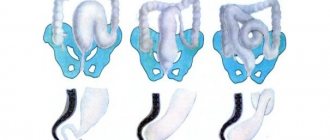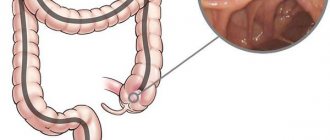Causes of atonic constipation
The causes of atonic constipation include the following factors:
- abnormalities of intestinal development;
- diseases of the endocrine system, changes in hormone levels (during pregnancy, menopause, etc.);
- neurological disorders;
- spinal cord injuries;
- taking medications that affect intestinal motility.
The cause of atonic constipation is a sedentary lifestyle. It is not necessary to have a sedentary job - atonic constipation also occurs after injuries and operations, when it is necessary to adhere to bed rest. Other possible causes include intoxication, exacerbation of inflammatory diseases, depression, bad habits, and infectious diseases.
A number of medications change muscle tone; antispasmodics, analgesics, antidepressants, some hormonal drugs, and medications that affect the transmission of nerve impulses can weaken it.
So-called idiopathic constipation has no known cause. Atonic constipation is often idiopathic in nature.
It is believed that intestinal dyskinesia is characteristic of functional constipation and irritable bowel syndrome with their predominance. But the slow movement of contents through the colon is associated with pathologies of the muscles and nervous system. There are two criteria by which an inert, or lazy, bowel is determined: resistance to laxatives and instrumental confirmation of slowing.
Establishing diagnosis
To diagnose atony, some additional examinations are prescribed:
- General and biochemical blood test, urine test.
- Ultrasound, which makes it possible to determine the severity of the disease and identify concomitant pathologies.
- Consultations with a gynecologist, surgeon, neurologist to identify the etiology of the disease.
- Culture of urine, smear from the urethra and vagina to exclude infectious causes of atony and inflammatory complications.
- Urography with contrast.
- MRI and CT.
After receiving the test results, the doctor clarifies the diagnosis, selects adequate therapy, and gives recommendations regarding lifestyle, physical activity, and diet.
Symptoms of atonic constipation
Symptoms include bloating, flatulence, abdominal pain, intestinal colic, and absence of intermediate urges between bowel movements. Researchers Shulpekova and Ivashkin in their scientific work indicate that “hypotonic or atonic functional constipation is associated with loss of tone of the colon. In this case, the delay in defecation can reach 5–7 days, the feces can be large in volume and loose in consistency” (Shulpekova, Ivashkin, 2004, p. 49).
However, this does not mean that dry and dense, fragmented feces cannot be observed. Stagnation of feces leads to the absorption of water from them, as a result of which the consistency of the stool changes. Often the act of defecation is accompanied by severe pain.
The characteristic symptoms of atonic constipation include the following:
- Bloating, flatulence. They develop against the background of stagnation of feces and excessive absorption of water from them.
- Pain in different parts of the abdomen. Often associated with gas formation, they can resemble intestinal colic - they appear periodically, without clear localization.
- Absence of intermediate urges between acts of defecation.
- Pain in the rectum. From time to time, due to overstretching of the rectal ampulla, cramping pain may occur.
There is a high probability of developing proctological complications, so blood and mucus are often present in the stool. If such symptoms occur, you should consult a doctor immediately.
Other symptoms are associated with general intoxication of the body with feces. Increased absorption of toxins in the colon leads to fatigue, pale skin, sweating, dizziness, decreased appetite, and nausea. These are nonspecific manifestations of poisoning, so they can persist for many years, and the person simply has no idea what is causing this feeling.
General information
Intestinal atony is a condition in which a person complains of disturbances in the process of bowel movement.
Such difficulties, first of all, are expressed in the fact that the intervals between acts of defecation are constantly increasing or stool is very difficult. With intestinal atony, a characteristic symptom is constipation , which indicates a number of pathological conditions or is a consequence of the effect of certain negative factors on the human body. Intestinal atony occurs as a consequence of loss of intestinal muscle tone. With intestinal atony, both spasms and noticeable muscle relaxation can be observed. Such problems very often become chronic and continue for the patient for many years.
Complications of constipation
Atonic constipation, like other types of bowel movement disorders, can lead to serious complications. In the long term, they affect the health of the cardiovascular system, increase the risk of strokes and heart attacks, malignant intestinal tumors, reduce resistance to infections, and stimulate the exacerbation of allergic diseases.
Complications such as hemorrhoids, anal fissures, proctitis and paraproctitis can occur even against the background of one episode of constipation if there is a predisposition.
Quite quickly, against the background of prolonged constipation, dysbiosis develops - a change in the balance of intestinal microflora can further aggravate the problem, lead to a deficiency of vitamins and minerals, and a general weakening of the body. Therefore, it is important to consult a doctor in a timely manner to correct the problem.
Consequences
A prolonged state of atony without treatment increases the risk of many diseases. These include:
- malignant neoplasms of the abdominal cavity (intestines, liver, stomach, uterus and ovaries in women, prostate and bladder in men, pancreas);
- hemorrhoidal bleeding;
- Iron-deficiency anemia;
- vitamin deficiency with impaired functioning of the gonads.
Slagging in the body causes a tendency to allergic reactions, itchy skin, and various rashes on the body.
Immunity sharply decreases, so patients often suffer from respiratory infections, chronic cystitis, men suffer from prostatitis, women suffer from inflammation of the uterus and appendages.
Features of treatment
Treatment of atonic constipation is complex. There are several approaches to drug therapy:
- motility regulators, enterokinetics, and other agents. They allow you to regulate intestinal motility by correcting the tone of the intestinal muscles.
- Drugs that indirectly affect the digestive system. This approach is used when atony is caused by other diseases. Medication support and correction can improve bowel function.
- Symptomatic therapy: laxatives for immediate relief, medications to eliminate symptoms of intoxication, painkillers. Such remedies complement the main course of treatment or other measures to normalize intestinal function.
It should be understood that basic and symptomatic treatment should be prescribed by a specialist. One of the main mistakes many people make is trying to help themselves with symptomatic treatment, laxatives or cleansing enemas, without undergoing examinations. Why is this an error? The choice of laxative should take into account the option of chronic constipation.
Doctors try not to prescribe laxatives that chemically stimulate peristalsis. Parfenov V.I. in his article explains why “the main disadvantage of the listed laxatives is the rather rapid addiction to them, the need to gradually increase the dose, significantly exceeding the permissible, and, as a consequence, degeneration of the mechanoreceptors of the colon” (Parfenov, 2013, p. 100 ).
But not only chemical laxatives can be addictive when taken over a long period of time. You should be especially careful with any senna-based laxatives, as prolonged use leads to addiction and the need to constantly increase the dosage to achieve a positive effect.
Regular use of cleansing enemas will also lead to the appearance of an inert colon - a lack of urge to defecate and worsening the problem.
Laxatives, which increase the volume of intestinal contents and osmotic pressure, are not addictive and can be used for constipation. But many patients require discontinuation of treatment due to bloating, painful cramps and other possible side effects.
Principles of effective treatment:
- competent selection of laxatives in accordance with the type of constipation;
- refusal of self-medication;
- following doctor's orders.
One of the non-addictive laxatives is Fitomucil Norm. It contains soluble and insoluble dietary fiber - the shell of psyllium seeds and the pulp of homemade plum fruits. The English drug acts gently and predictably, helping to restore normal stool. "Fitomucil Norm" does not cause side effects in the form of spasms, pain, false and repeated urges to defecate. Psyllium absorbs water, turning into a gel, which allows you to gently remove feces. Insoluble fiber stimulates intestinal motility. Long-term use of the drug is allowed in consultation with a doctor.
Symptoms and treatment of atonic constipation are always strictly individual: it is important to determine the cause of the disorder and correct it. To do this, the doctor will prescribe a comprehensive diagnosis. You may need to consult other specialists: endocrinologist, neurologist.
Alternative medicine recipes
Folk remedies based on medicinal herbs , as well as food, have long been used to eliminate the symptoms of atony:
- The easiest way to treat the disease is the daily consumption of vegetable oils: olive, flaxseed, sunflower. It is recommended to choose an unrefined product and drink 10 ml of it every morning on an empty stomach. This method is contraindicated for those who suffer from chronic calculous cholecystitis, as it can cause the movement of stones and blockage of the bile duct.
Treatment with vegetable juices is popular. Its essence is to drink freshly squeezed carrot, cucumber, and beetroot juice every morning, preferably before breakfast. If you have concomitant stomach diseases (chronic gastritis, peptic ulcer), it is better to consult a gastroenterologist before starting juice therapy.- A salad made from fresh grated beets and carrots, taken in equal quantities and seasoned with unrefined vegetable oil, perfectly cleanses the intestines and improves peristalsis. It is recommended to consume 150 g of this salad daily for 4 weeks.
- It is recommended to eat 100 g of prunes, dried apricots and figs steamed in boiling water every evening. Such a remedy will not only enhance peristalsis and eliminate constipation, but also saturate the body with vitamins and microelements.
- Buckthorn bark in the form of an infusion has long been used to treat various intestinal diseases. Preparing the infusion is simple: steep 40 g of crushed raw materials in a glass of boiling water for 2 hours. Drink throughout the day.
- A decoction based on a series effectively combats the problem. To prepare it, you need to boil two tablespoons of dry herb in half a liter of water for several minutes, and after infusing for 30 minutes, filter the composition. Drink the resulting volume throughout the day, dividing into 2 doses.
- A decoction based on flax seed quickly and gently eliminates constipation and restores normal intestinal motility. It should be prepared from a tablespoon of seeds and a glass of water. Boil the raw material for a few minutes over low heat and leave. Consume the entire amount immediately before bedtime. Continue treatment for 2 weeks.
- A mixture based on aloe and honey has a therapeutic effect for intestinal atony. It’s easy to prepare: grind 100 g of medicinal plant leaves without skin, mix with 200 g of warm honey. After steeping for 24 hours, take a tablespoon before breakfast. The resulting volume is sufficient for one therapeutic course.
- An unusual remedy for stimulating peristalsis is green tea. For treatment, you should choose a large-leaf variety, grind the raw material using a coffee grinder and consume a teaspoon three times a day, preferably before meals. Continue therapy for at least 10 days.
- An alcohol tincture based on rhubarb leaves and calamus rhizomes effectively eliminates chronic constipation and intestinal atony. It must be prepared from crushed dry raw materials and medical alcohol in a ratio of 1:10. The composition should be infused for at least 14 days, then filtered and taken a teaspoon twice a day for 2 weeks.
- Burdock leaves have a good laxative effect. It’s easy to prepare a decoction based on them: 40 g of crushed leaves per 500 ml, boil for a few minutes, leave overnight to infuse. Take a glass of the product in the morning and evening, preferably before meals, for 7 days.
- For mild atony, it is recommended to drink a cup of tea with oregano every morning. For 250 ml of boiling water you will need 5 g of dry herb. After infusion for 15 minutes, the composition is ready for use. Continue treatment for 14 days.
Herbal remedies have their own contraindications and side effects, so it is recommended to take them in moderation, following the instructions.
Treatment of medicinal constipation
Atonic constipation may be associated with medications. This effect occurs not only with an overdose, but also as a side effect. We are talking about narcotic analgesics, anticholinergics, hormonal drugs, drugs for normalizing blood pressure, iron supplements, antidepressants, etc.
In some cases, it is advisable to choose an alternative and adjust the treatment regimen for the underlying disease in order to prevent the development of complications from the digestive system. But this should only be done by a doctor.
Therefore, contact a specialist and tell them about the medications you are constantly taking and the associated atonic constipation: he will definitely provide qualified assistance and give recommendations.
Get rid of intestinal problems
The natural British drug is not addictive and works immediately
Find Fitomucil with benefits
Diagnosis of intestinal atony
In the process of diagnosing the disease, it is very important to find the causes of intestinal dysfunction. Consequently, the doctor must conduct a survey of the patient, finding out the characteristics of his lifestyle, nutrition, and heredity. In addition, a stool analysis and bacteriological culture of stool are performed. If necessary, the patient is also prescribed a colonoscopy to identify pathologies of the large intestine. It is very important to consult a gastroenterologist and proctologist in time, because uncontrolled use of laxatives can aggravate the disease.
Lifestyle correction
The treatment strategy for atonic constipation is as follows:
- regulation of stool with the help of dietary fiber and water regime (at least 1.5 liters of clean water per day);
- restoration of the lost morning defecation reflex, that is, the habit of emptying the intestines after breakfast;
- maintaining physical activity.
Doctors pay great attention to the psychological state and mood. For example, researchers Marinchuk A. T., Bogatyrev V. G. and others in their work focus on “the need to live with daily morning stool” (Marinchuk, Bogatyrev, Babieva, Koumbatiadis, 2012, p. 53).
You should adjust your daily routine so that going to the toilet in the morning does not become a problem. It is advisable to get up earlier, provide conditions without haste, so that you do not have to restrain the urge.
Methods for preventing pathology
Prevention of intestinal atony consists of following the principles of proper nutrition, starting from childhood (the child must develop the concept of healthy nutrition), the presence of mandatory physical activity, as well as the timely identification and treatment of diseases that can cause a decrease in intestinal tone.
Intestinal atony has a good prognosis with a general examination, timely detection and treatment of the cause of atony, and adjustments to diet and lifestyle. In general, intestinal atony responds well to treatment. Exceptions are cases of lack of innervation (as in Hirschsprung's disease), organic damage and other severe diseases.
Exercise and physical activity
It is important to increase physical activity: make it a habit to take morning and evening walks, jogging, play sports to the extent physically possible, and swim. If atonic constipation is the result of an injury or a disease of the musculoskeletal system that requires long-term immobilization, then it is important to consult a doctor.
The specialist will develop an exercise program individually, taking into account capabilities and general health. Constant bed rest and complete abstinence from exercise are not indicated in almost any case, except for the most severe ones, so movement is a necessary component of improving the functioning of the gastrointestinal tract.
Exercises such as “bicycle”, leg lifts, and walking are useful. If it is impossible to perform the exercises, you should resort to a kind of passive activity - do a light abdominal massage. Movements should be soft, careful, clockwise.
Establishing diagnosis
To diagnose atony, some additional examinations are prescribed:
- General and biochemical blood test, urine test.
- Ultrasound, which makes it possible to determine the severity of the disease and identify concomitant pathologies.
- Consultations with a gynecologist, surgeon, neurologist to identify the etiology of the disease.
- Culture of urine, smear from the urethra and vagina to exclude infectious causes of atony and inflammatory complications.
- Urography with contrast.
- MRI and CT.
After receiving the test results, the doctor clarifies the diagnosis, selects adequate therapy, and gives recommendations regarding lifestyle, physical activity, and diet.
Nutrition/diet
Meals should include foods rich in plant fiber and contain fermented milk products. There should be more plant foods than animal products. This will help improve the functioning of the digestive tract, increase the volume and facilitate the excretion of feces. Bran is useful - separately or as part of special bread. These are natural laxatives, just like vegetable oils.
But you should remember: bran is a source of insoluble dietary fiber, the consumption of which in large quantities can provoke increased constipation and increased gas formation. If you are prone to constipation, it is better to pay attention to products containing predominantly soluble dietary fiber.
From the diet you need to exclude foods that thicken the stool and cause increased gas formation:
- potato;
- legumes;
- white bread, pastries;
- spicy dishes;
- smoked meats;
- canned food and marinades;
- chocolate;
- crackers;
- peeled rice, etc.
The daily menu can be based on lean meats, poultry, fish, cereals (except rice and semolina), vegetables, and it is better to steam them. Can be used boiled. Dried fruits have proven themselves to be excellent, especially dried apricots, prunes, and raisins. You can use them on their own or make compotes from them.
Try to limit yourself to six grams of salt per day, otherwise the likelihood of developing fluid retention increases, and swelling is often accompanied by constipation.
It is important to consult a doctor first, especially for people with chronic diseases. The specialist will give precise recommendations regarding the diet.










